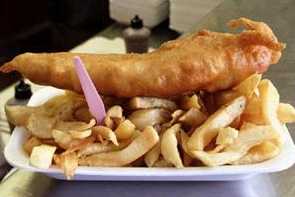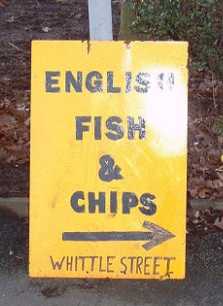Mind Streaming
John Coxon's Online Journal|
Archive Search |
| Links |
|
and s-integrator |
Saturday, February 15, 2003
The English Pub Second left in this image is a traditional pint. You have either a handle or on the extreme left, the straight pot which these days is far more common than the handled traditional pint. (1 pint=.568 litres) To me the pint pot, with a handle, is essentially the way an Englishman ought to get his beer. The other two glasses are alien imports. The word pub is an If you prefer, the pub you adjourn to is the one you are known in. (Cheers as it were, but with a bit of history actual history to it!) Within a square mile of where I live there are ten pubs, mostly small ones. Some are specifically geared to younger people of legal drinking age, and which I studiously avoid at all costs. (A rite of passage for local teenagers, by the way, and in fact nationally, is to reach sixteen and run the gauntlet of, I am legally 18, let me try and buy a beer in the pub and I thus confirm I am an adult even though I am actually lying about my age! I managed it, being, genetically, a very large person even then, but to some it begs public humiliation! The loud music and the rowdy lads and lasses slurping back bottle after bottle of designer label drinks is not my thing. In the last few years we have seen the development of binge-drinking as a new leisure activity, amongst young men and women with a bob or two to spend (slang for a tenth of our Pound Sterling in the old days) on having a good night out and a parallel growth in the number of places which have been deliberately designed or modified to accommodate and profit from their revelry. For them, the measure of how good the night out is commensurate with the degree of difficulty they have remembering it, the day after, it seems to me! Some modern, that is, recently built, Some tame architect is commissioned to create more selling and drink consuming space from the old layout, and some other newly qualified dimwit artificially recreates that old world charm, which has just been trashed, in order to increase buck revenue from the punters. Ha-Ha. I prefer my pubs to be original, probably owned by a small private brewery, one of an increasingly rare breed, that hasn't been swallowed up the few, huge, predatory leisure companies that today dominate what we now call the hospitality industry. My favourite pubs haven't been touched for yonks.( a long time) One of my real favourites is left as nature intended, largely because the small independent brewery that owns it and a chain of other small pubs in the Manchester area, is in fact reported to be too tight (miserly) to actually want to modify any of them. My old pub, (marital end, moved on, don't go there anymore), occasionally will get a visit from the brewer's painters and decorators to restore the heavily embossed wallpapers to white gloss and then are not seen again until the smokers have turned it sufficiently caramel-coloured to require repainting. Brand new pub and inn designers (You'd think Guinness, for example, is There were, in the North and elsewhere in England a vast number of independent local breweries that made their own beers. They owned the pubs and the pubs were tied. They employed, franchised, landlords and landladies who are obliged, contractually, to sell their beers and other home grown drinks and no others. I know personally, of two couples, who were sacked by their employers for illicitly selling other brands for their own profit, something a tied landlord does for personal gain but with dire consequences when you are caught out. There are When you enter a pub, over the door you will see a sign proclaiming that x or y are the named persons, the landlord or landlady, licensed (by local magistrates [lay judges] who also dictate the opening hours), to sell intoxicating liquors. Hence the expression, licensed premises referring to pubs and bars where alcohol can be consumed essentially, from a legal point of view, on the premises. An offlicence is where drinks can be sold (booze stores for I remember the days when pubs had a special small bar or hatch, or even separate door where you could buy drinks to take away, off license. Locally the booze shops, which seems to grow in number weekly, are known as the offy. Booze stores are big competition for the pubs and bars these days, the sales of wine and spirits, bottled and canned beers, and lagers for home consumption, have risen dramatically and spirits and wines in particularly are much cheaper in such outlets. It is possible to get out of your head for £5.00 with a small bottle of spirit. That might buy you two pints of beer in the local pub, depending on where you live! Alcohol is a very interesting legally available highly potent and addictive drug it seems to me. It can cause a host of terrible things to happen, do a lot of personal and public damage when misused, and in one sense, pubs, bars and off-licensed booze One of the essentials of a traditional pub, that is the pub in original form, was the sale of two different types of locally produced ales which were barrelled in wood and later steel or aluminium kegs, brought to the pub cellars by what were and still, are called draymen and then piped up to the bar. Traditionally, a hand pump was used to suck the stuff up from the cellar and into your beer glass, although these days, compressed gases, BEER HAND PUMPS (WHITE HANDLES The consumption of lager, as opposed to Now, thus far, it may seem to you that, I still remember the shire horses pulling dray wagons and loved watching wooden barrels being cleansed, the coopers actually making and repairing beer barrels and the blacksmith shoeing the horses and making barrel bands. I loved the place and was saddened when the haunt of my youth became, effectively a theme park. I can still sense the smell of boiled hops, part of the beer brewing process, the aroma that hung beautifully in the air of my childhood, not only from the brewery chimneys but also from the small holding plots of land which kept piles of waste hop chaff to enhance the Dorset soil. The smell isn't there any more, the brand has disappeared, but the original buildings, or what is now left of them, still bring back some of the sensations. And what can you expect inside a traditional pub? That of course depends on whether it is a long established premises or a new one, where you live and who now owns the premises and what clientele they are pitching to attract. You should know that, in fact many pubs these days are pretty dead certain days of the week, with just a few faithful locals, dutifully holding the fort. Increasingly, pubs have been forced to think more carefully about ways of filling the place and so we see karaoke, live DJs, Quiz nights and live bands, all attempts to drum up patronage on slacker days of the week. The Traditional Dart Board In my day, God, I sound old, we had a darts board, a bar-billiard table, or a crown green bowling green out back or a full size snooker table or tables upstairs or a skittle alley (not a pool table in sight) to help you while away an evening as you downed a few pints of bitter. You could ask the landlord for a pack of cards and buy pickled eggs or onions at the bar. They had a juke box in some of them. BAR BILLIARD TABLE The Manchester Log End Dart Board. In those days there were distinct sections in the pub. There was the public bar, or in the North, where I am now, the Vault, and the lounge. Working men and locals who wanted to spit and swear, in their work duds or everyday clothes used the public bar or the back room, or vault, played darts, billiards and watched T.V. The lounge was a bit more posh ; you took your mother-in-law there or your girl friend probably in your best clothes. The prices varied a little from bar to bar. Women were often excluded from the public bar (vault) in those days, it was men only understood and you'd probably have been thought of as a kind of whore if you plonked yourself, as a women, in the public bar/vault, but that might just be my rich imagination. Addendum This is the first part of a two part piece about pubs. In my next entry I confirm that I have in fact a criminal record. To some extent my detailed knowledge of the drinks industry is partly fuelled by guilt driven study of alcohol and its abuse which developed during a drink-drive rehab course that the local magistrates tempted me to attend with the promise of a reduction in the duration of my driving ban. For a while I was, thereafter, involved in a lot of alcohol education work and became an expert on the effects

abbreviation of public house, not to be confused with the word inn, which is, however, generally a pub these days, but technically, and if we are being pedantic (which I am here) should have both accommodation, food and alcohol in its brief. Inns come from the highwaymen days, when British roads were uncomfortable, cratered dirt tracks, journeys were long and dangerous and stagecoaches required relays of fit horses if your destination was ever to be reached. (Check out Tobias Smollett's hilarious Humphrey Clinker early novel on this one, literary minded peeps, for more on the joys of early British travel conditions way back. Tobias, by the way, is considered the father of the modern novel.
The Turk's Head:
A genuine English inn, near my home town of Weymouth
on the south coast of England
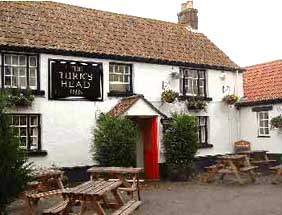
Inns were the places which stabled fresh teams of horses and where passengers could be accommodated overnight, aled and dined, at modest costs. Most of our roadside pubs, in remote rural areas at least, the real ones I mean, were in former times, roadside inns in the true sense of the word.
pseudo-oldie-worldy pubs call themselves inns, which along with the plaster cast beams and carefully selected reproduction antiques, is an unsubtle attempt to recreate the ambience of former days with generally little success. They are actually the work of some tarty interior designer with wads of corporate cash, modifying (read destroying) an original pub that isn't making enough money, or starting from scratch. I have seen, in more than one instance, let me tell you, these bizarre creatures at work. There is such a bitter irony at work here. Original pubs with their dado rails, Victorian plaster-coved ceilings, their upholstered, turned mahogany-legged comfy leather bound settles, their etched windows, their natural wood bars and shelves of little collections of eccentric knickknacks (that made such places unique) were skipped away, the place completely gutted, and then, Hollywood comes to town. (Skipped/skip, by the way is a large metal container that you hire, put your junk in, and then a lorry arrives, jacks up the skip, and takes it to the refuse dump.)
often use recycled bricks and reclaimed timbers to create the illusion of a history that extends beyond last week. They are essentially synthetically tailored premises for taking more of your money. Alas, pubs and inns are now, almost universally under the control of a few global conglomerates who dominate the drinks' trade and own the premises where their drinks are purveyed. 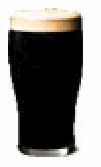
essentially, Irish but see who owns the brand name now, and it isn't anyone with an Irish name!) What were traditionally unique drinks are now just brand names on a particular conglomerates growing list of financially captured products, to be marketed worldwide with, actually, no real sense of responsibility. Drinking has to be made to seem an attractive pursuit, and they target younger people in this regard almost exclusively, to increase sales; the politically correct, mission statement rhetoric on booze selling corporate web sites, in respect of anticipated moderation, is complete, hypocritical bullshit, it seems to me.
other premises which we call free houses, that is they are not tied to a particular brewery and therefore sell a much wider range of beers and spirits.
example ) that must be taken off the premises to consume. Incidentally, only recently, it has become an offence to drink alcohol in certain areas on the street, and these areas are determined by local legislators to combat the increasing nuisance of people, I guess mostly younger ones, drinking in the street.
stores are a kind of dependency centre for some people. To our government, that addiction, (and tobacco as well, in its various forms) is a potent revenue earner, and each budget seems to increase the tax on them year by year! This is very important because our National Health Service needs the revenue to fund health care for those affected by it. Cannabis on the other hand, well need I say more, as an aging hippy, remains classified narcotic and illegal but tax free if you can get it.
sadly, are used in the main. Thus a person behind the bar will pull you a pint.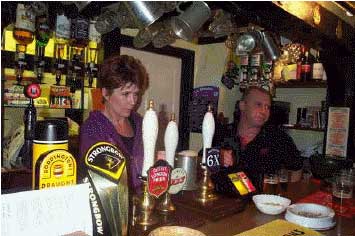
HERE)
These ales, those from the wood, keg or
barrel are either my personal favourite, bitter beer, or the darker mild beer. The gassy, light coloured imported lager beers were originally only available from bottles, although these days many are on tap as we say, at the bar. (Tap is faucet to you, if you are an American.) I tend to categorise lager and American style beer drinkers as the
younger end of the market and the more traditional beers as being the
preference, as a general rule, of the more mature (in the age sense at least) pub drinker.
traditional ales is, in terms of my age at least, a relatively new culture. Indeed a whole new cultural/ genre has been created through the irresponsible consumption of lager, and manifests itself in the law courts and in shaming news reports where our hooligan subculture members get completely tanked up (drunk, legless, plastered, pissed, out of their skulls, etc) and disgrace themselves though anti-social behaviour. I speak of course of the lager lout. It seems ironic that many of these English people, usually young men, are inclined to be somewhat racist, behave shamefully in a chauvinistic way abroad, at international football matches for example, but their indiscretions are not fuelled by ales native to home but by the very brews actually manufactured by the nationals who they are abusing at that particular time. What is increasingly of sociological interest at least, is the way in which female youngsters, of drinking age, seem inclined to behave equally outrageously in small groups ,determined to spend the weekend between the working week, in a drunken stupor. These behaviours are often seen at their worst on holidays abroad, where bars are open all hours, alcohol is cheaper, and guys and gals are equally disgraceful in bringing the nation into disrepute and where host nationals despair at the their irresponsible use of alcohol, the activity which seems to me, to be the chief aim of some young Brits at least, holidaying in such places.
having written all this off the top of my head (with no additional research at all) I seem to know quite a lot about the subject. Some of this is personal experience of a life time, nearly forty years of visiting pubs in various locations, but not generally as a daily or even weekly ritual but an occasional visitor for the most part. I actually spent my formative years in a house very near to a traditional local brewery that served a large area in the south of England. Those buildings have now been Disneyfied, sadly, and have become a principal tourist attraction in the seaside town where I was brought up. 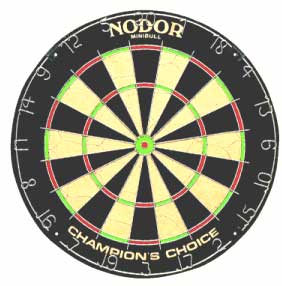
/ favourite pub game
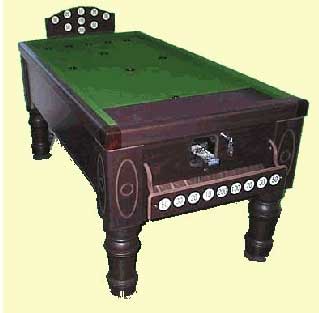
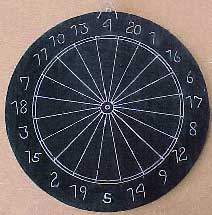
This requires extra precision in dart throwing, is made from a real log end, and thus has to be immersed in water when not in use to prevent cracking.
of alcohol, pathology and worked with a couple of national agencies producing campaign posters and educational materials. I even had sensible dialogues with government ministers, Euro M.Ps and the like, challenging our lax drink driving laws and drink unit labelling issues. All that effort convinced me of the sinister vested interest and ultimate power of the drinks' industry lobby, as heinous as is the U.S, pro-gun lobby and tobacco magnets, between you and me. Money talks real time, big time, writers just scribble. 
(I can confirm, by the way, dear readers, that, as one inclined to wonder off the point, and ergo, a master of the non-sequitur, and a bit of a linguist, Mary and Joseph were not, in fact, turned away by various inn keepers with no vacancies! Essentially, something was lost by the translators from the original Greek; For Inn, we should have read upper room. Bethlehem-native-Palestinians BC/early AD, lived, spilt level, (real estate fans), with the animals housed in the lower section of the house. The happy couple probably found the relatives were overcrowded upstairs (because of the Roman mandate for them all to go to original home base). Hence, Jesus and his parents got the straw end of the deal and a lot of very young children, doing nativity plays worldwide, annually, are labouring under a misapprehension, when they give the no room at the Inn spiel.
johncoxon 4:06 AM - [Link] - Comments ()
... Thursday, February 13, 2003
I have a request from Carol to write about the English pub, all facets, including how they are owned (especially the real estate) and run, what they mean to our culture, how lucrative they may or may not be and how they might compare to an American bar (or not). She is especially curious about their being Mom & Pop operations and if the owners live in some portion of them. Details to follow!
johncoxon 5:35 AM - [Link] - Comments ()
...
Tuesday, February 11, 2003
UK Real Property
I am providing information in my blog for Carol's American students. I have already started posting information and they have already begun reading it. What follows is additional material to further aid them in understanding real estate throughout the world and not just in the states. This info is slso over on the left and through this posting in the archives. In case I need to move it from the left column, it will be permanently part of my archives by this posting.
1. This is our comprehensive local government website: Salford
2. This part of Salford's web site is specific to housing with law, contracts and so on: Salford Housing
3. Here you wil find all the details of different housing that the City rents out: Salford Leasing
4. Here I clicked on the search by area button, clicked on my area Swinton and came up with this house for you. Before you get too excited, note that it is on the Valley Estate, which is notorious locally, although resident's groups are trying to resolve problems there.
Houses to buy or rent in the commercial sector are in the domain of what we call Estate agents and I have flagged up here one of the local ones so you can see the range of properties and their prices.
They basically advertise and promote the house you want to sell, show folks round, usually by appointment and offer a guided tour. They take a percentage of what they manage to sell the house for. They usually advise you on what sort of price you can put your property on the market for. Recently the law changed so they had to take the poetry out of their spec sheets. Now they have to be factual and not say things like a desirable residence in a sought after area, but a lot still do. Of the areas covered by this estate agent, Worsley is the most popular post code in terms of desirable locations, but as everywhere in the city, no one district is all cosy and calm and there are rough bits of Worsley too. You have to know the districts.
Consumer Rights vs. Estate Agents
This web site address will take students to pages on consumer protection for using estate agents when buying and selling properties. It also makes reference to the Scottish system, which I like because it prevents the greedy buggers who go in for gazumping ( using insider information to put in a bigger though not always significantly bigger offer in order to knock someone out of line for buying a place). We also have the chain problem that Carol tells me you have too but she says that it isn't much of a problem, that usually everyone in the chain closes in the states. This is those people waiting for their new buyer to close on his house so he can close on theirs, and then waiting for someone down the line to do the same. Hence, caught in a chain, something that doesn't happen to first-time buyers.
A good site to compare the scene in Northern Ireland (part of the United Kingdom) follows and includes interactive tours and more.
Houses Interactive
To find U.K. commercial and industrial property use:
Agent Alert
Try this site for a glossary of estate agent jargon from A-Z.
Jargon
I have been looking quite a while for a site that satirises estate agents by giving examples of what they say on old specs and then what it really means. I found one with a few examples.
Estate Agent Satire
More humour but what we call estate agent speak; a lot more examples of linguistic misrepresentation!
Estate Agent Speak
johncoxon 5:30 AM - [Link] - Comments ()
...
FRYING TONIGHTSunday, February 09, 2003
Statistically, in the realm of hot food takeaways, the traditional fish and chip supper is still the front runner in Britain, with an estimated 300 million servings (against 219 million Indian, and 210 million Chinese takeaways) per annum, according to a 1999 survey. A staggering 60,000 tonnes of fish and 500,000 tonnes of potatoes are fried up annually. The market has an estimated turnover of some six hundred million pounds a year.It is perhaps re-assuring that fish and chip shops or 'chippies' as they are affectionately known, still outnumber McDonald's, eight to one. That is a surprise given that the dread plastic yellow and red rash is sprouting everywhere you turn it seems. They don't deserve to succeed in my view! This based just on their corporate global meanness in terms of the paltry,standardised portion of 'French Fries' they cardboard out. They don't seem to do fish yet, but maybe a species has not yet been discovered with the flavour of their burgers, that of undercooked ,synthetic bathroom sponge.
We learn that over 70f the UK population eats fish and chips more than once every six months and just under 50at it once a month. 14f all adults eat fish and chips once or twice a week. Within a mile of where we live there are at least four chippies, two English ones and an Indian and Chinese takeaway (that offer this traditional fare along with their own eastern delights.)
It turns out that this great British tradition probably originates from the enterprise of a Jewish immigrant, Joseph Malin, who, in the 1860's opened the first fried fish and chip shop in the East End of London. The arrival of steam in the industrial revolution, the invention of icing equipment and rail transport apparently stimulated the business by making larger quantities of fresh fish available more cheaply. There was, we are told, at the same time, a general increase in the incomes of working class Britons enabling them the luxury of buying the fish supper. The business peaked in the late twenties when there were an estimated 35,000 chip shops in Britain, but that number has gone down to roughly 8600 these days.
The typical chippy is usually run by a husband and wife team in a small shop the size of a downstairs room in the average house. These days fish and chips are fried in a variety of relatively heart-friendly oils where once they used cholesterol soup; heart-stopping animal fat called dripping. Raw fresh fish is dipped in a mixture of flour,egg and water, then fried in hot oil to produce a crispy coating called' batter'. Chips are far chunkier than the American french-fried equivalent. 'Bits' are also given out if you ask specifically. These are the delicious crunchy but greasy beads of fried batter that accumulate on the hot fat surface and are regularly scooped off by hand with a wire mesh sieve. There are variants such as the 'mushy' pea, and also the option of having your chips doused in gravy or curry sauce. The combined portion of fish and chips is usually shovelled onto grease proof paper and then wrapped in newsprint. In former times it was always old newspapers but more and more, it is virgin newsprint paper. The paper is a form of insulation that keeps the food warm (unless you live some ways from the shop.) No one as yet seems to have solved the mystery of just why some of your hot chips weld themselves instinctively to the greaseproof paper. Some chippies, these days, issue their portions in white polystyrene foam trays and may also throw in a wooden or plastic fork. Traditionally, depending on your taste and how far you are prepared to risk cumulative health problems, you will normally accept or decline the offer of having salt and vinegar sprinkled over your meal for you.
Frying fish and chips is an art involving getting just the right temperature and knowing when they are exactly ready for release from the scalding fat fryer and into the paper. There are of course a lot of indifferent chippies where the product is either too greasy, under-or-over cooked. People will travel out of their way to the better ones if they are fussy. There are published league tables and national directories for the best chippies and also a number of web sites that guide you to the locations of the best. There are thousands of other web entries under fish and chips. Try out these sites for more information.
Plaice and Chips
Federation of Fish FriersIt is alleged that, whilst many neighbourhood chippies are still in the hands of local natives, it has been only the willingness of other two ethnic groups to add fish and chips to their takeaway menus that preserves the popularity of the national dish.
From time to time you will see chippies with huge nationalist Union Jacks on their fascias. Or temporary road signs like this example, directing the passing traffic to a chippy just off the beaten track. Personally I find this sign and those like it offensive and even bordering on the racist. It is a way, too, of capitalising on the myth that the Chinese and Indians aren't good at fish and chips. This is also pretty ironic given that, in terms of takeaway meals actually sold , those in search of an easy meal, statistically don't differentiate that much between the three rival providers. The issue of what is and what isn't 'English' is another story of course, given the ethnic diversity of Britain, but in the context of this yellow sign, the use of 'English' , I instinctively think, is objectionable.
johncoxon 10:28 PM - [Link] - Comments ()
...
Every year, the more authoratative English dictionaries reluctantly welcome in new words and phrases that have become common parlance , but then, there are a lot more that have been sitting there for years and not that wellknown. One such word is 'malapropism', and I feel quite smug that I ,not only know what it means but from whence it came. As a student of literature, I was taken along to see Sheridan's Restoration Comedy'The Rivals'at the Old Vic in Bristol in my late teens. Mrs Malaprop was the lady with the scripted misfortune of being open to ridicule with her ludicrous misuse of words and phrases. Hence we have malapropisms.Two recent favourites were somebody's mum talking about the 'electrical register' (electoral register) and living in a 'Terrenced'house(terraced house.)The term 'mondegreen', on the other hand, I had never heard of until recently, when I tripped over it in a web search. Jimmy Hendrix accidently provided what is probably the best example of a mondegreen in the lyric of the classic 'Purple Haze'. Now Jim intended to be excused while 'he kissed the sky', but to some ears, it sounded like he was sorry he wanted to 'kiss this guy'. Then there was the immortal Beatles line, from 'Lucy in the sky with Diamonds' ,where the 'girl with colitis goes by', misheard as an illness rather than the drug induced glaze in those'Kaleidoscope' eyes.
Children can be a rich source of mondegreens. They love to sing and repeat what they hear, but are prone , in their limited language experience, to mishear things, with often hysterically funny consequences. A favourite of mine is the ?prairie tortoise?, nothing to do with a nomadic, slow-moving shelled reptile. It was a child mishearing an earnest request for the assembled school to bow their little heads and say, together 'the prayer He taught us.' Another song favourite Bob Dylan's 'Blowin in the wind' gets a whole new angle from the mondegreen 'the ants are my friends'instead of the ?answer my friend?The term mondegreen originated, according to a web site I visited, from Sylvia Wright's mishearing of a line in the Scottish folk song,' The Bonny Earl Of Morray' .It should read 'Oh, they have slain the Earl of Morray and laid him on the green' but she heard 'Oh, they have slain the Earl of Morray and Lady Mondegreen'. I just want to know now, who Sylvia Wright is or was, and how that one obscure event has given us that new word. I?ll let you know if I find out.
johncoxon 6:06 PM - [Link] - Comments ()
...



